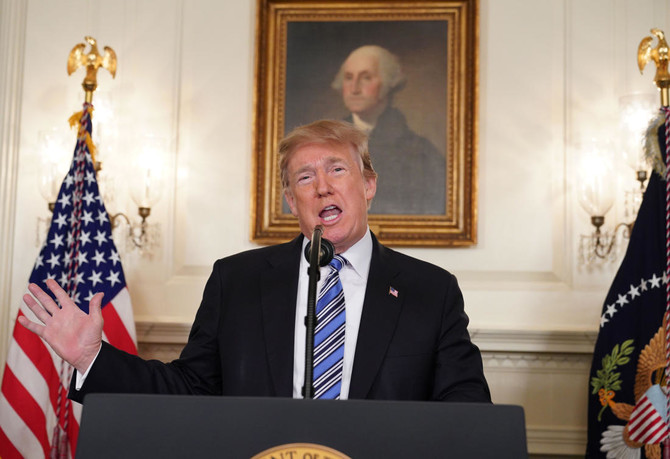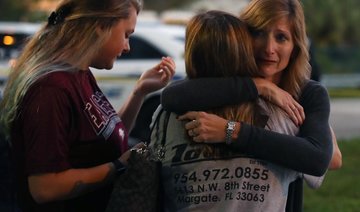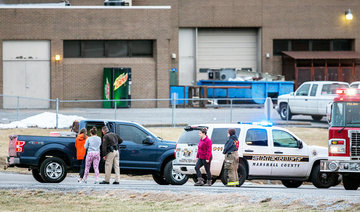WASHINGTON: President Donald Trump struck a solemn tone Thursday after the deadly school shooting in Florida, describing a “scene of terrible violence, hatred and evil” and promising to “tackle the difficult issue of mental health,” but avoiding any mention of guns.
Taking up the now-familiar ritual of public consolation after terrible violence, Trump spoke from the White House Diplomatic Room. In a slow, deliberate style, he sought to reassure a troubled nation as well as students’ families and shooting survivors in Florida.
“We are all joined together as one American family, and your suffering is our burden also,” Trump said. “No child, no teacher, should ever be in danger in an American school.”
Trump, who owns a private club in Palm Beach, Florida about 40 miles from the town of Parkland, where the shooting happened, said Thursday he was making plans to visit the grieving community.
He did not answer shouted questions about guns as he exited the room.
The president’s address came a day after a former student opened fire at the Parkland, Florida, high school with an AR-15 rifle, killing 17 people and injuring 14 more. It was the nation’s deadliest school shooting since a gunman attacked an elementary school in Newtown, Connecticut, more than five years ago.
At the Capitol, the usual divisions over gun laws were evident.
House Minority Leader Nancy Pelosi, a California Democrat, said in a statement that it is time for action. “Congress has a moral responsibility to take common-sense action to prevent the daily tragedy of gun violence in communities across America,” she said. “Enough is enough.”
Senate Majority Leader Mitch McConnell, a Republican from Kentucky, did not mention guns as he said the Senate would observe a moment of silence at noon. “To say that such brutal, pointless violence is unconscionable is an understatement,” he said.
Before he was a candidate, Trump at one point favored some stricter gun restrictions. However, early in his administration, he told the National Rifle Association he was their “friend and champion.” He signed a resolution passed by the GOP-led Congress blocking an Obama-era rule designed to keep guns out of the hands of certain mentally disabled people.
Trump on Thursday praised teachers and first responders and also offered a direct message to children.
“I want you to know that you are never alone and you never will be,” Trump said. “You have people who care about you who love you and who will do anything at all to protect you. If you need help, turn to a teacher, a family member, a local police officer or a faith leader. Answer hate with love, answer cruelty with kindness.”
Trump also pledged that his administration would work with state and local officials to improve school safety and to “tackle the difficult issue of mental health.”
He later added that “it is not enough to simply take actions that make us feel like we are making a difference, we must actually make that difference.”
Trump, who did not speak publicly immediately after the shooting, weighed in on Twitter early Thursday, calling the suspect “mentally disturbed” and stressing it was important to “report such instances to authorities, again and again!” He tweeted about the shooting twice on Wednesday, expressing condolences and saying he spoke with Florida’s governor.
The president also issued a proclamation mourning the victims and ordering American flags at public buildings across the country flown at half-staff.
Trump has offered consolation before after horrific violence. A mass shooting in Las Vegas last year was the deadliest in modern history, with a gunman killing 58 people and injuring hundreds more, before killing himself. And a shooting in a Texas church in November left more than two dozen dead.
He has largely focused on mental health as a cause for mass shootings, dismissing questions about gun control.
After the Texas church shooting, the president said, “This isn’t a guns situation.” When he visited Las Vegas to mourn with the families of those victims, Trump called the shooter “demented” and a “very sick individual,” though he added that “we’ll be talking about gun laws as time goes by.”
The 19-year-old suspect, Nikolas Cruz, is a troubled teenager who posted disturbing material on social media. He had been expelled from Marjory Stoneman Douglas High School for “disciplinary reasons,” Broward County, Florida, Sheriff Scott Israel said.
Mayor Beam Furr said on CNN that the shooter was getting treatment at a mental health clinic for a while, but that he hadn’t been back to the clinic for more than a year.
While Trump has offered sober responses to some tragedies since he took office, he has also drawn criticism for more inflammatory reactions to acts of violence.
After the Orlando shootings at a gay nightclub that left 49 dead, he tweeted, “Appreciate the congrats for being right on radical Islamic terrorism.” In the wake of a deadly terror attack in London in June, he went after the Mayor Sadiq Khan on Twitter, suggesting he wasn’t taking the attacks seriously enough.
Trump cites mental health in shooting, no mention of guns
Trump cites mental health in shooting, no mention of guns

Heavy shelling, explosions spark fear along Pakistan-Afghanistan border

- Residents fear for their safety amid border clashes
- 1,500 Afghan families displaced due to heavy shelling and explosions
- Pakistan denies targeting civilians, says its strikes focus on militants
LAL PUR, Afghanistan/PESHAWAR, Pakistan: People living along Pakistan’s border with Afghanistan said they were considering fleeing their homes because of heavy shelling and explosions as fighting between troops from both sides entered a seventh day on Wednesday.
The South Asian allies-turned-foes have engaged in their worst fighting in years following Pakistani airstrikes on major Afghan cities last week, increasing volatility in a region also on edge over US and Israeli strikes on Iran.
Islamabad has said its airstrikes, which have at times directly targeted the Taliban government, are aimed at ending Afghan support for militants carrying out attacks on Pakistan. The Taliban has denied aiding militant groups.
SHELLING STARTS AS VILLAGERS ARE BREAKING RAMADAN FAST
Residents of towns and villages in Pakistan’s northwest said fighting between border forces starts in the evenings, placing their homes in the line of fire, often at sunset when families are breaking their fast in the holy month of Ramadan.
“There is complete silence in the day, but the moment we sit for iftar dinner, the two sides start shelling,” Farid Khan Shinwari from Landi Kotal, a town near the Torkham border crossing, told Reuters.
“We open our fast in extremely difficult situations, as you never know when a shell can hit your house.”
Residents in the town and nearby villages said there had been heavy shelling and some explosions heard in the past few days, prompting many to flee their homes.
On the other side of the border, Afghans shared similar stories of skirmishes and families fleeing their homes.
Hundreds had been displaced to an open dirt field under makeshift tents, while others had no shelter at all. Officials say around 1,500 families have fled their homes.
Fighting along the 2,600-km (1,615-mile) border has ebbed and flowed over the week-long conflict, with both sides saying they have inflicted heavy losses on the other country and gained ground in the fighting.
Reuters has been unable to verify these accounts.
TURKEY HAS OFFERED TO MEDIATE
Turkish President Recep Tayyip Erdogan told Pakistani Prime Minister Shehbaz Sharif that Ankara would help reinstate a ceasefire, the Turkish Presidency said on Tuesday, as other countries that had offered to mediate have since been hit by the conflict in the Gulf.
On Wednesday, both countries reported exchanges of heavy fire, with Afghanistan’s defense ministry saying Taliban forces shot down a Pakistani drone and captured seven border posts.
A spokesperson for the ministry said 110 civilians, including 65 women and children, had been killed since the fighting began and another 123 were wounded. The United Nations mission for Afghanistan has listed 42 deaths so far.
Pakistan’s Information Minister Attaullah Tarar disputed both figures, saying: “Pakistan exercises great care in only targeting terrorists and support infrastructure. No civilian structures have been targeted.”
On Saturday, Pakistan struck “ammunition and critical equipment” at the Bagram air base north of Kabul, Tarar said, a key American command center through the 20-year Afghan war.












